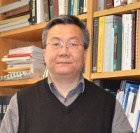Shouheng Sun
Professor
Department of Chemistry
Brown University
Tuning Nanoparticle Catalysis for Efficient Electrochemical Reactions
Recent advance in solution phase chemical reactions has made it possible to design and synthesize nanoparticles with nearly precise controls on nanoparticle sizes, shapes, compositions and structures for catalytic applications. In this talk, I will summarize the common methods we used to synthesize monodisperse nanoparticles, especially intermetallic nanoparticles, core/shell nanoparticles, nanowires and their self-assemblies on conducting supports. I will use Au-, Pt-, Pd-, Fe-, and Cu-based elemental and alloy nanoparticles as examples to demonstrate the rational tuning and enhancement of nanoparticle catalysis for electrochemical reduction of O2, electrochemical oxidation of HCOOH and other chemical reactions for renewable energy applications.
Biography
Professor Sun's research in nanomaterials involves two related areas: (1) chemical synthesis and self-assembly of nanoparticles; (2) construction and elaboration of functional nanoparticles and their assemblies for applications in catalytic reactions, nanomedicine, and magnetic energy/data storage.
Wednesday, September 19, 2018
- Time: 11.00 AM
- Location: 206 Furnas Hall
- Seminar Flyer

Shouheng Sun
Professor
Brown University